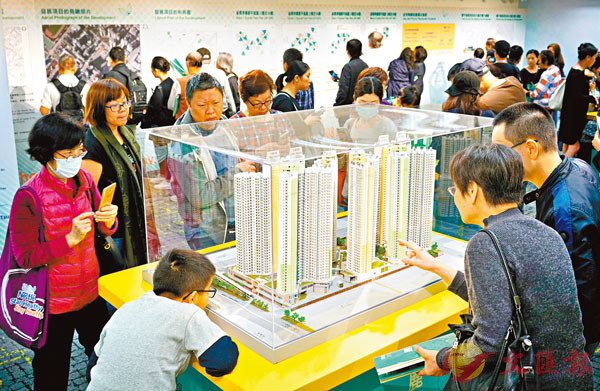 ■施政報告提出放寬按揭保險計劃,助用家以較低首期上車。 資料圖片
■施政報告提出放寬按揭保險計劃,助用家以較低首期上車。 資料圖片【原文】特首林鄭月娥在新出爐的施政報告提出放寬按揭保險計劃,助用家以較低首期上車,首置人士九成按保計劃的樓價上限,由原來400萬元提升至800萬元,而八成按保計劃樓價上限,則由600萬元提升至1,000萬元;更吸引的是,如果首置人士未能符合「加3厘」的壓力測試,仍可申請承造最高八成或九成按揭貸款,只是保費會因應風險因素作額外調整。對於首次置業者而言,雖然首期減少,但要捱高樓價、每月供款激增及更長期的供款負擔。一成首期可以「上車」,但也意味樓價跌一成就可能變成「負資產」,市民置業更需量力而為,根據個人負擔能力及對經濟大勢變化的預判,審慎把握置業時機。
不少年輕專業人士和中產一族對置業有殷切需求,放寬按保樓價上限,無疑有助解決首期不足問題。但針無兩頭利,施政報告宣佈放寬按揭措施後,市場即有反應,有物業代理表示,有放盤業主即時封盤,有報道指有新界業主將放盤價提高100萬,未來樓價可能重拾升軌。市場對政策措施有即時反應,是意料之內的。
在新措施下,一名首置業主可借盡九成按揭,未計算其他費用下,以800萬的物業為例,只需80萬首期即可上車,相信有利更多中產一族圓「上車」夢。假設該首置業主以2.625厘利率,分30年還款的條件申請九成按揭,在未計算保費的情況下,每月要還款2.8919萬元,故他的家庭月入要超過5.7838萬元,始能通過最基本的供款及入息比率條款獲得貸款,但要通過較高要求的壓力測試,即假設利率再上升3厘,家庭月入則要超過6.9079萬元。如果樓價隨經濟轉差而下跌,「負資產」問題將嚴重打擊這個群體,作為買家自然應該謹慎。
前車之覆,後車之鑒。香港經歷過金融風暴和沙士蹂躪,期間樓價插水,由高位下跌最多七成,一度錄得逾10萬宗「負資產」,當年每10個供樓人士便有兩個是「負資產」, 這段痛苦經歷,港人刻骨銘心。
新措施雖然降低上車或換樓門檻,但在目前本港樓價仍處高位的情況下,準置業者應充分評估風險。首先是由於首置借貸額增加,每月供款亦會大增,其次是繳交15%額外保費,變相增加供樓開支。更不能忽視的是,在中美貿易戰及本港暴亂的環境下,本港經濟受到內外夾擊,陷入衰退的風險越來越高,裁員失業潮的「冷風」隨時颳起。經濟繼續惡化,樓市逆轉,必然加大「負資產」的風險。希望付出低首期而「上車」的市民,此時更要注意風險,量力而行。 (摘錄自香港《文匯報》
社評18-10-2019)
Potential home buyers should act according to their own capabilities as mortgage rules ease
【譯文】New measures to assist home buyers were rolled out as Chief Executive Carrie Lam Cheng Yuet-ngor announced a relaxation of rules under the Mortgage Insurance Programme in her new policy address.
For first-time home buyers, the cap on the value of properties eligible for a mortgage loan with a maximum cover of 90 per cent loan-to-value ratio will be raised from the existing HK$4 million to HK$8 million. The cap on the value of apartments eligible for mortgages of up to 80 per cent will also be raised from HK$6 million to HK$10 million. What is more tempting is that even if first-time home buyers cannot meet the three percentage point stress testing requirement, they will still be eligible for up to 90 per cent mortgage loans, subject to an additional adjustment to the mortgage insurance that is based on relevant risk factors. Although first-time home buyers can now pay less in terms of down payment, the fact that home prices are still at a high level means the mortgage repayment will now take even longer, and they will also have to pay more on each month. A 10 per cent down payment can make you a property owner, yet it also means a 10 per cent drop in the property market will break you as you will be in negative equity. Potential home buyers should always keep an eye on economic forecasts and act only according to their own financial capabilities.
As there has always been a strong demand for housing from many young professionals and middle-class families, the relaxation of mortgage rules will undoubtedly help them by lowering down payment sums. However as the Chinese saying goes, "no needle is sharp at both ends", and the property market has reacted immediately after the new measure is announced. Property agents believe that the property market may be back on a rising track soon as they revealed some of their clients have promptly decided to cancel their listings, while there are also reports of a seller in the New Territories raising the asking price by HK$ 1 million. It is within expectation that the property market will react quickly to government policies.
With the new measures in place, a first-time buyer can borrow up to 90 per cent of a property's value. Taking a property that is valued at HK$8 million as an example, a first-time buyer is required to pay merely HK$800,000 without counting other costs. Many from the middle-class will now be able to fulfil their dreams of becoming a homeowner. Assuming that a first-time buyer obtains a 90 per cent mortgage at a rate of 2.625 per cent on a 30-year loan, the monthly mortgage payment (excluding the premium) would be HK$28,919. Considering the basic debt-to-income ratio, the first-time buyer's monthly household income should be no less than HK$57,838. But if we also take into consideration the stress test and add another three per cent to the mortgage rate, then the first-time buyer should have a monthly household income of over HK$69,079. An economic downturn and a fall in property prices would hit these first-time buyers severely as they might face the problem of negative equity. Therefore, any potential buyers must use caution when dipping into the market.
The property market of Hong Kong once nosedived up to 70 per cent during the Asian financial crisis and the SARS outbreak. At its peak, over 100,000 households found themselves in negative equity, with two in every group of ten mortgage-payers being stuck with negative equity. This is a painful experience for many in Hong Kong, and the lesson must be learnt.
Although the threshold for becoming a homeowner or switching to new flats has now been lowered, potential buyers should calculate the risks carefully given that property prices are still at a high level. As the mortgage cap eases, the monthly payment sum would also increase. Together with the extra 15 per cent mortgage premium, monthly expenses on mortgage repayment would be heavier. Moreover, with the ongoing US-China trade war and local political crisis, there is an increasing risk of an economic downturn in Hong Kong. Layoffs and unemployment may return at any time. As the risk of negative equity substantially increases in times of economic downturn, potential home buyers who wish to benefit from a reduced down payment should calculate the risks and act according to their own capabilities.■Jeffrey Tse
Exercise
1. 按揭
2. 施政報告
3. 負資產
4. 保費
5. 首期
Answer
1. mortgage
2. policy address
3. negative equity
4. premium
5. down payment

